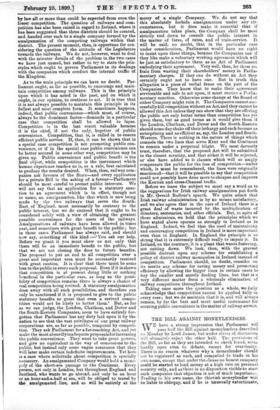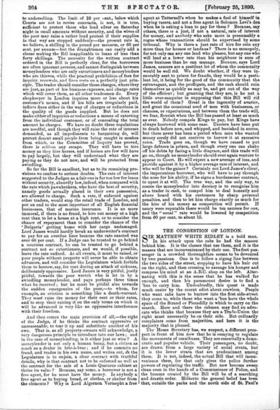THE BILL AGAINST MONEYLENDERS.
E have a strong impression that Parliament will
pass half the Bill against moneylenders described on Monday by Lord James, but under stress of discussion will ultimately reject the other half. The provisions of the Bill, so far as they are intended to check fraud, seeui hardly open even to debate, except for over-lenity. There is no reason whatever why a moneylender should not be registered as such, and compelled to trade in his own name, except that under the clause no honest company could be started to lend money at a high rate on personal security only, and as there is no disposition visible to start such companies that objection is not of much importance. Trading iu his own name, the thievish moneylender will be liable to obloquy, and if he is unusually extortionate,
to underselling. The limit of 10 per cent., below which Courts are not to revise contracts, is not, it is true, sufficient to protect those who lend silver on Saturday night in small amounts without security, and the wives of the poor may raise a rather loud protest if their supplies in that way are stopped suddenly—the present rate is, we believe, a shilling in the pound per mensem, or 60 per cent. per annum—but the draughtsmen can easily add a clause making the Bill inapplicable to loans of less than forty shillings. The necessity for the written contract ordered in the Bill is perfectly clear, for the borrowers are often ignorant persons, and cannot distinguish between moneylenders who are only extortioners and moneylenders who are thieves, while the practical prohibition of fees for inquiry. renewals, and fines rests on a perfectly just prin- ciple. The trader should consider those charges, where they are just, as part of his business expenses, and charge rates which will cover them, as all other tradesmen do. Every shopkeeper in London inquires more or less about his customer's means, and if his bills are irregularly paid, inflicts fines either in the way of charges or reductions in the quality of the goods supplied. But he does not make either of inquiries or reductions a means of extorting from the individual customer, or of concealing the total amount he charges. We have no doubt these regulations are needful, and though they will raise the rate of interest demanded, as all impediments to bargaining do, will protect decent small people from being caught in meshes from which, as the Committee of Inquiry has proved, there is seldom any escape. They will have to hire money as they hire horses, and if horses are few will have to pay largely, but they will understand what they are paying as they do not now, and will be protected from swindling.
So far the Bill is excellent, but as to its remaining pro- visions we confess to serious doubts. The rate of interest suggested to the Judges as a. fair one is far too low for loans without security, absurdly low,indeed, when compared with the rate which pawnbrokers, who have the best of security, namely goods actually placed in their own possession, are allowed to charge. Such a rate, if enforced against other traders, would stop the retail trade of London, and put an end to the most important of all English financial businesses, that of marine insurance. It is no more immoral, if there is no fraud, to hire out money at a high rent than to let a house at a high rent, or to consider the chance of repayment than to consider the chance of the ' Bulgaria' getting home with her cargo undamaged. Lord James would hardly break an underwriter's contract to pay for an overdue liner because the rate exacted was over 60 per cent. If a Judge can be trusted to go behind a usurious contract, he can be trusted to go behind a contract not so extortionate, and we would, if possible, leave the rate unfixed. At all events, it must be raised, or poor people without property will never be able to obtain advances, and will consider the Legislature which forbids them to borrow, say, for rent during an attack of sickness, deliberately oppressive. Lord James is very pitiful, justly pitiful, towards the poor wretch who is let in by a swindling moneylender, and pays perhaps three times what he received ; but he must be pitiful also towards the sudden emergencies of the poor,—to whom, for example, an eviction is something like a death-warrant. They must raise the money for their rent or their rates, and to stop their raising it on the only terms on which it will be advanced is very like an oppressive interference with their freedom.
And then comes the main provision of all,—the right of the Judge, if he thinks the contract oppressive or unreasonable, to tear it up and substitute another of his own. That is, as all property-owners will acknowledge, a very dangerous. principle to introduce into our laws ; and in the case of moneylending, is it either just or wise ? A moneylender is not only a human being, but a citizen as much as a dealer in bric-a-brac ; and if he commits no fraud, and trades in his own name, and writes out, as the Legislature is to enjoin, a clear contract with truthful details, why is that contract not to be enforced as well as the contract for the sale of a Louis Quatorze cabinet at thrice its value ? Because, say some, a borrower is not a free agent, for he must have the money. Is anybody a free agent as to buying bread, or clothes, or shelter from the elements ? Why is Lord Algernon Verisopht a free agent at Tattersall's when he makes a fool of himself in buying racers, and not a free agent in Solomon Levi's don when he is asking a loan to pay for them ? Because, say others, there is a just, if not a natural, rate of interest for money, and anybody who asks more is presumably a rogue whose transactions should be supervised by some tribunal. Why is there a just rate of hire for coin any more than for houses or landaus ? There is no monopoly, for not only oan any one lend who pleases, but any one who will lend at a lower rate than his neighbour is sure of more business than he can manage. Because, says Lord James, usurers are a pestilent lot of whom the community would be well rid. We doubt whether, if they were in- exorably sent to prison for frauds, they would be a pesti- lent lot, it being for the good of the community that the extravagant, and the profligate, and the rash should ruin themselves as quickly as may be, and get out of the way of the efficient ; but granting that they are, is he not a little over-sanguine in supposing that this Bill will rid the world of them ? Great is the ingenuity of avarice, and great the occasional need of men with businesses, or chances, or expectations, and between them the trade will, we fear, flourish when the Bill has passed at least as much as ever. Nobody compels Kings to pay, but Kings have always borrowed with some ease. Usurers have been put to death before now, and whipped, and banished in scores, but there never has been a period when men who wanted money sorely did not contrive to borrow it at excessive rates. Trade goes on, though we have ceased to put large debtors in prison, and though every one can shake off his debts by facing a little disgrace, and this trade will go on, though no moneylender should ever again venture to appear in Court. He will expect a new average of loss, and provide against it by a higher average rate of interest, and who will be the gainer ? Certainly not Lord James's client, the impecunious borrower, who will have to pay through the nose for his ability, if he signs a burdensome contract, to upset it at will. The true way, and the only way, to coerce the moneylender into decency is to recognise him as a trader in cash, to compel him to deal honestly and above board with his customers by sharp personal penalties, and then to let him charge exactly as much for the hire of his money as competition will permit. If usury were reputable there would be ten usurers for one, and the " usual " rate would be lowered by competition from 60 per cent. to about 15.







































 Previous page
Previous page